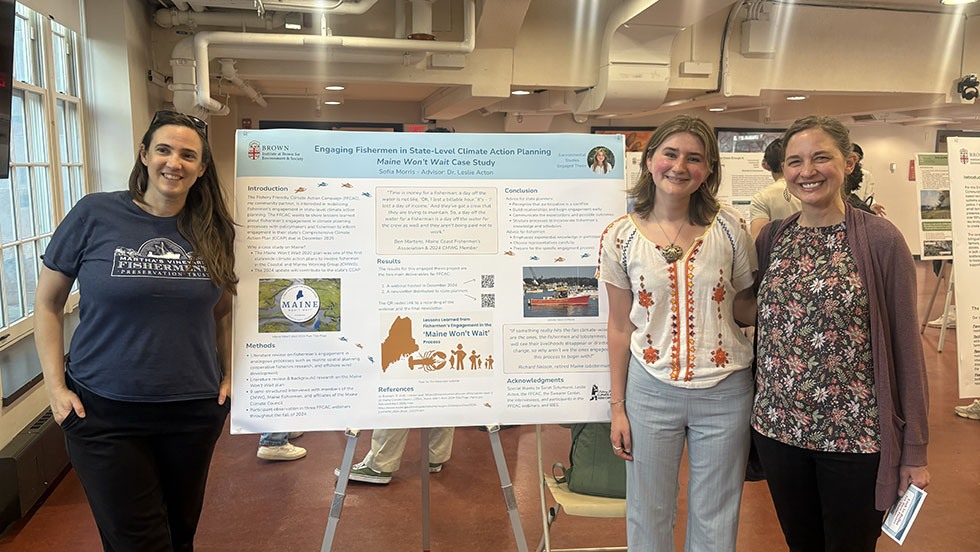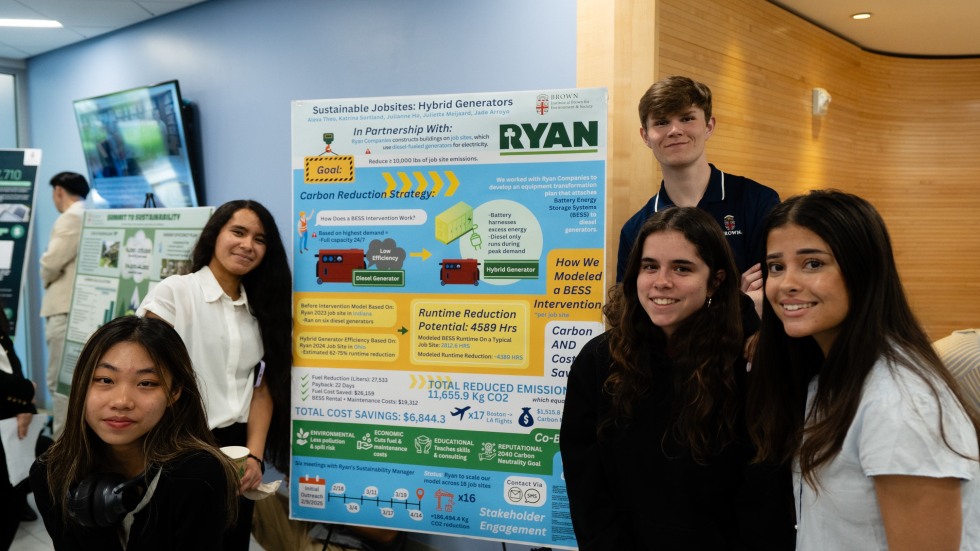The Environmental Sciences and Studies (ENVS) concentration at Brown University is built for curious, motivated students who want to shape solutions for our changing planet. Our program combines flexibility, a strong sense of community, and a defining commitment to engaged scholarship.
5 Hallmarks of an ENVS Education
What sets us apart? Discover the unique value of ENVS in preparing students to tackle real-world environmental challenges.
5 Hallmarks of an ENVS Education
What sets us apart? Discover the unique value of ENVS in preparing students to tackle real-world environmental challenges.
#1 Engaged scholarship: serving the community and beyond
What is engaged scholarship?
Engaged scholarship is a hands-on approach to education where students learn by working directly with communities, agencies, and nonprofits to tackle real environmental challenges. It builds practical skills, fosters meaningful partnerships, and creates lasting impact at local, national, and global levels.
Examples include:
- Environmental Health: Partnering with the RI Department of Health to improve heat-wave resilience and reduce children’s exposure to pollutants.
- Conservation: Working with The Nature Conservancy and U.S. Fish and Wildlife Service to restore habitats and protect biodiversity.
- Environmental Governance: Supporting UN delegations in designing equitable climate adaptation frameworks.
Through specific courses (ENVS 0110, ENVS 1421, ENVS 1555, ENVS 1557, and ENVS 1574), research opportunities, and internships, students contribute meaningfully to communities in Rhode Island and around the world. Additionally, those who wish to deepen this commitment may pursue the Engaged Scholarship Certificate offered through the Swearer Center.

Sofia Ghilzai Morris ’25 (center) presented her senior thesis at the IBES Research Poster Session in May 2025. Her research highlighted how Maine’s climate planning can more effectively include fishermen in shaping mitigation and adaptation strategies. She is pictured with fisherman Sarah Schumann (left) and Associate Teaching Professor Leslie Acton (right).
#2 Empowering students to chart their own course
The flexible ENSVS curriculum offers two degree options (AB or ScB) and draws from the sciences, social sciences and humanities, encouraging students to think across disciplines, ask bold questions, and pursue the issues they care most about.
#3 A culture of support
With guidance from faculty, peer advisors, and dedicated staff, every student is supported in building a course of study—and a vision for the future—that reflects their unique goals and strengths.
| Resource | Details |
|---|---|
| Director of Undergraduate Studies | ENVS advising for prospective and current concentrators |
| Academic Program Manager | for logistical support |
| Concentration Advisor | to help map your academic path |
| Capstone/Thesis Advisor | for senior project guidance |
| Peer Advisors | with firsthand experience, advice, and mentorship |
| Student Hub & Weekly Bulletin | with curated job opportunities, events and more |
| Environmental Careers Workshop Series | for hands-on career guidance |
| ENVS Lunchtime Seminar Series | highlights scholars and activists in the field |
| Community-building Events | events, student clubs and committees, volunteer opportunities |
“ My favorite thing about the ENVS community was the consistent support and community programming which facilitated relationship building and learning beyond the classroom. ”
#4 Career preparation for what’s next
ENVS students can master skills that directly translate to their post-graduate endeavors, including:
- Policy analysis
- Hands-on lab work in biology, earth science, chemistry, and more
- Community-focused research
- Geospatial data collection and mapping
- Science writing
Where can an ENVS degree take you? In addition to pursuing master’s and Ph.D. programs around the world, recent alumni work in:
- Climate, environmental, and policy consulting
- Education
- Environmental, public interest, and civil rights law
- Public health and medicine
- Local, state, and federal government
- Private-sector ventures from environmental remediation to renewable energy
- Science journalism
- Transportation and utilities

How can we tackle the carbon challenge? Through a semester-long project, students in EEPS/ENVS 0360 partner with a variety of organizations to put carbon reduction strategies into action.
#5 A lifelong network
With over 100 current concentrators, a vibrant Alumni & Friends network, and dedicated faculty, ENVS offers more than a degree—it connects you to a lifelong community of environmental thinkers, doers, and leaders.
Engage with IBES
Discover meaningful ways for environmentally focused Brunonians to build connections, support Brown students, and stay up to date on IBES’ latest developments.